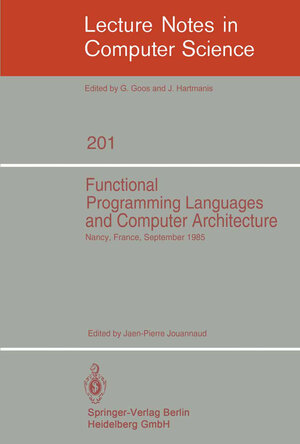
×
![Buchcover ISBN 9783540396772]()
Functional Programming Languages and Computer Architecture
Proceedings, Nancy, France, September 16-19, 1985
herausgegeben von Jean-Pierre JouannaudInhaltsverzeichnis
- Miranda: A non-strict functional language with polymorphic types.
- Data flow graph optimization in if1.
- Strictness analysis — a practical approach.
- The categorical abstract machine.
- High order programming in extended FP.
- Secd-m: a virtual machine for applicative programming.
- Cobweb — A combinator reduction architecture.
- How to replace failure by a list of successes a method for exception handling, backtracking, and pattern matching in lazy functional languages.
- Lazy memo-functions.
- An architecture for fast data movement in the FFP machine.
- An architecture that efficiently updates associative aggregates in applicative programming languages.
- Lambda lifting: Transforming programs to recursive equations.
- Optimizing almost-tail-recursive prolog programs.
- Designing regular array architectures using higher order functions.
- $$v\mathcal{F}\mathcal{P}$$ : An environment for the multi-level specification, analysis, and synthesis of hardware algorithms.
- A distributed garbage collection algorithm.
- Cyclic reference counting for combinator machines.
- Design for a multiprocessing heap with on-board reference counting.
- A functional language and modular architecture for scientific computing.
- Practical polymorphism.
- Program verification in a logical theory of constructions.
- Transforming recursive programs for execution on parallel machines.
- Compiling pattern matching.
- Serial combinators: „optimal“ grains of parallelism.
- The G-machine: A fast, graph-reduction evaluator.



